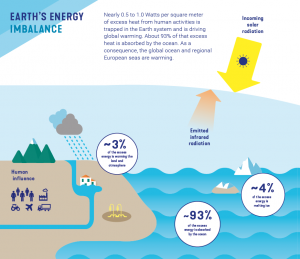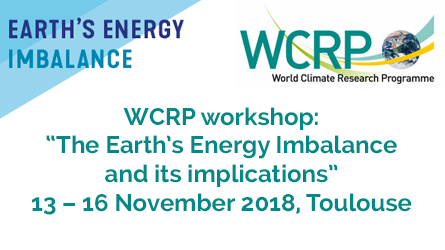The World Climate Research Program (WCRP) is holding a workshop entitled “The Earth’s Energy Imbalance (EEI) and its implications” in Toulouse, France from November 13th to 16th, 2018. The ocean absorbs some 93% of the excess heat in the atmosphere; as such monitoring the ocean is of the utmost importance.
The current EEI describes the excess heat in the Earth system that is mostly caused by human activity and is driving global warming. The absolute value of EEI represents the most fundamental metric defining the status of global climate change, and will be more useful than using global surface temperature.
Mercator Ocean International (MOI) is a sponsor of the workshop along with the European Space Agency (ESA) and the French Centre National d’Etudes Spatiales (CNES). Karina von Schuckmann, MOI oceanographer, is chairing the Scientific Organization Team of the workshop. She has an expertise in diagnostic analysis of ocean heat content, global sea level, and Earth’s energy balance. She has done several in-depth analyses of the Argo data set focused mostly on the ocean heat content but is now also involved in the freshwater (or salinity) aspects. She is the lead author of the Copernicus Marine Service Ocean State Report, which covers ocean heat content and other key ocean monitoring parameters. She is also a lead author of the Intergovernmental Panel on Climate Change (IPCC) special report on the ocean and cryosphere in a changing climate (SROCC).

Figure appears in the Ocean State Report 2: modified after von Schuckmann et al., 2016, Nature Climate Change, (DOI: 10.1038/NCLIMATE2876)
Background:
The WCRP aims to determine the predictability of climate and the effect of human activities on climate. EEI is addressed in most of the WCRP’s 4 core projects. Two projects are directly relevant and will be discussed: Climate and Ocean Variability, Predictability and Change (CLIVAR) and Global Energy and Water Exchanges (GEWEX). CLIVAR’s mission is to understand the dynamics, the interaction, and the predictability of the coupled ocean-atmosphere system. To this end it facilitates observations, analysis and predictions of changes in the Earth’s climate system, enabling better understanding of climate variability, predictability and change. EEI is a topic developed by the CLIVAR research focus “Consistency between planetary energy balance and ocean heat storage” (CONCEPT-HEAT). GEWEX is an integrated program of research, observations, and science activities that focuses on the atmospheric, terrestrial, radiative, hydrological, coupled processes, and interactions that determine the global and regional hydrological cycle, radiation and energy transitions and their involvement in global changes. CONCEPT-HEAT has been active for 4 years, and will declare success at the end of 2018, as the activity is expanded to become more WCRP-wide.
Goals, Objectives and Expected Outcome of the workshop:
The main objective of the workshop is to initiate a new WCRP-wide activity and to thus strengthen and extend the community on the Earth’s energy imbalance through a community wide discussion on links across all the WCRP Core Projects and relevant activities. The expected outcome is to identify research goals and opportunities focused on the Earth’s energy imbalance, and synthesize the various aspects across WCRP, through:
- Discussion and reporting on how the CONCEPT-HEAT topic could evolve into a WCRP topic, together with research goals and priorities.
- Strengthening future international scientific collaborations with experts concerned with the flow of energy through the climate system, and its implications for climate variability on multiple time scales.
- Developing plans for future assessments of the EEI and its variability with the aim of documenting uncertainties, assessing their implications for prediction, and identifying future observational needs.
- Developing a community paper on the EEI, or equivalent (e.g. a special issue).

